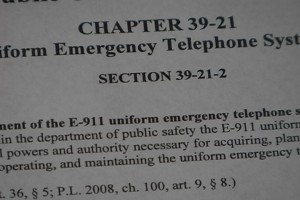 Fifteen hundred times a day on average, 911 operators ask callers if they have an emergency and whether they need police, fire or medical help. More than half a million calls last year came into the statewide E-911 center housed in the state police headquarters complex in Scituate, then were routed to the appropriate local agency.
Fifteen hundred times a day on average, 911 operators ask callers if they have an emergency and whether they need police, fire or medical help. More than half a million calls last year came into the statewide E-911 center housed in the state police headquarters complex in Scituate, then were routed to the appropriate local agency.
It’s a high-stress job where seconds matter — literally. Especially if somebody is having a heart attack or a burglar is breaking into a house.
“Employees matter. You have to answer that phone,” said Rhode Island State Police Col. Steven O’Donnell, who also oversees the state Department of Public Safety and the E-911 system. But 911, which every cell phone and landline owner helps fund through a monthly surcharge, has seen a steady decrease in manpower since it was established in 1988. And the number of calls put on hold has increased 25% the past four years.
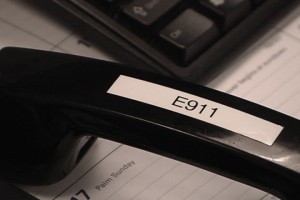 The Hummel Report first looked at the issue in 2011, discovering that 13,000 calls that year went into queue — the agency’s term for put on hold. Some for as a little as two seconds, the longest two minutes and the average just under 12 seconds. The situation has gotten worse. Last year more than 16,000 calls were put on hold; that’s an average of 45 a day and up more than 3,000 calls from four years ago.
The Hummel Report first looked at the issue in 2011, discovering that 13,000 calls that year went into queue — the agency’s term for put on hold. Some for as a little as two seconds, the longest two minutes and the average just under 12 seconds. The situation has gotten worse. Last year more than 16,000 calls were put on hold; that’s an average of 45 a day and up more than 3,000 calls from four years ago.
“There’s an expectation that when you call 911, you’re not put on hold,” Col. O’Donnell said. “That would be an expectation of everybody. The reality is, sometimes people are.”
Col. O’Donnell said 911 does an exceptional job under the circumstances, noting that the calls put on hold account for only 3% of last year’s 511,000 calls, and that some of them come when there is a major emergency and multiple people are calling in simultaneously about the same problem.
But the numbers tell the story: When 911 was established 26 years ago, there were 60 telecommunicators to handle 100,000 calls in Rhode Island. A decade ago the manpower was down to 44. And the past several years it’s been 29 operators to handle five times the original number of calls.
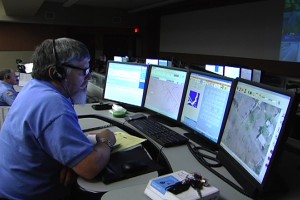 Although the center can accommodate up to 14 telecommunicators, sometimes there have been as few as five on a given shift. On the day we visited last month there were six on duty, plus a supervisor.
Although the center can accommodate up to 14 telecommunicators, sometimes there have been as few as five on a given shift. On the day we visited last month there were six on duty, plus a supervisor.
“We’re doing more with less statewide,” Col. O’Donnell. “It really has nothing to do with public safety. Every year since I’ve been the colonel … we prepare budgets and somewhere you gotta cut. If you’re over budget you have to cut.”
In order to handle the calls the department has had to call back telecommunicators for forced overtime. One told us four years ago he could not handle the stress of watching calls go on hold repeatedly and ultimately left his job.
This year the surcharge we all pay on cell phones and landlines will bring in close to $20 million, but 911 is only getting $5.4 million of that because the General Assembly years ago eliminated so-called restricted receipt accounts. In other words, the money goes into the General Fund and 911 has to fight for its budget every year along with every other department. It wasn’t supposed to be that way.
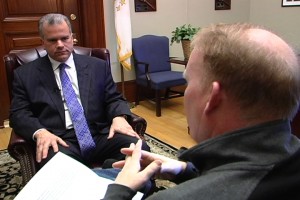 House Speaker Nicholas Mattiello told us he has confidence in the 911 system and relies on Col. O’Donnell’s recommendations every year at budget time. “We will consider their budget requests in this legislative session and we’ll make sure it’s appropriately funded. And that will be a collaboration between public safety and our finance committee.”
House Speaker Nicholas Mattiello told us he has confidence in the 911 system and relies on Col. O’Donnell’s recommendations every year at budget time. “We will consider their budget requests in this legislative session and we’ll make sure it’s appropriately funded. And that will be a collaboration between public safety and our finance committee.”
We asked the Speaker: If the surcharges were originally intended for 911, should the state still charge people the same amount when the money is going somewhere else? “That’s a different issue,” he said. “We’re not going to build a 911 system that’s bigger than it needs to be, that’s inefficient or inappropriate. Whether we should reconsider the fees we charge on it is a totally different issue and of course, we’ll look at all of those issues.”
Col. O’Donnell says five new telecommunicators came on board last month, but there is a six-month training period to get them fully up and running. And there is no net gain in employees as 911 recently lost three people and was already down several more that had not been funded.
“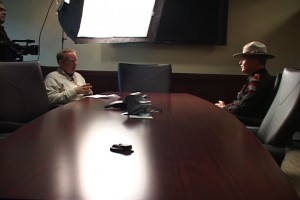 In a perfect world, I’d like to see zero (calls on hold); I think as a superintendent of state police and commissioner of public safety, no one should be put on hold, but the reality is sometimes people really are.”
In a perfect world, I’d like to see zero (calls on hold); I think as a superintendent of state police and commissioner of public safety, no one should be put on hold, but the reality is sometimes people really are.”
The Hummel Report is a 501 3C non-profit organization that relies, in part, on your donations. If you have a story idea or want make a donation go to www.hummelreport.org, where you can also see the video version of this story. You can mail Jim directly at jim@hummelreport.org.
More Posts by The Author:
The Hummel Report: A Quarterly Update
Hummel Report: New Rotary at CCRI
Rhode Island Spotlight: Westerly Library
The Hummel Report: Do We Need an Inspector General?
The Hummel Report: Age Is Just a Number … ‘Til it Isn’t

